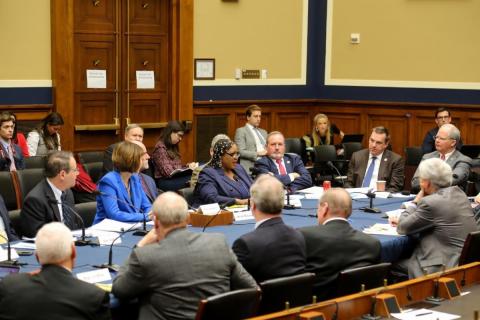Hudson Addresses Rising Energy Prices, Protects Strategic Oil Reserves, Amid NC Gas Price Surge
Washington D.C. – As North Carolina experiences some of the largest increases in gas prices in the country, U.S. Representative Richard Hudson (R-NC) voted today to protect America's Strategic Petroleum Reserve (SPR) from China. Earlier this week, Rep. Hudson also participated in a roundtable discussion focused on solutions to address rising energy prices. According to AAA, gas prices in North Carolina are up 14 cents from one week ago, as home heating prices are also on the rise this winter. The latest inflation data released by the U.S. Bureau of Labor Statistics today shows electricity prices rose 14.3% over the past year.
"Like many states across the country, North Carolina is currently seeing another steep rise in the price of gas and energy. The Biden administration created this crisis by stifling energy production, and their only response has been to turn to foreign adversaries and deplete our Strategic Petroleum Reserve to its lowest level since 1983," said Rep. Hudson. "Instead, we need real solutions to unleash American energy and drive down costs for families."
Rep. Hudson has been a champion of energy solutions including cosponsoring the American Energy Independence from Russia Act last Congressthat would approve the Keystone XL pipeline, unleash U.S. Liquified Natural Gas exports, restart federal oil and gas leasing, and protect energy and mineral development from attacks by the Biden administration. Rep. Hudson is also an original cosponsor of the Strategic Production Response Act, which would increase oil and gas production on federal lands should the President issue a release of reserves from the Strategic Petroleum Reserve for non-emergency reasons.
The Protecting America's Strategic Petroleum Reserve from China Act passed by the House today prevents the Secretary of Energy from selling any SPR oil, meant for times of weather or national security emergencies, to an entity affiliated with the Chinese Communist Party (CCP) or any entity that intends to export it to China. Last year, the Biden administration sold one million barrels of SPR oil to a CCP-affiliated company. The bill was approved by a vote of 331-97.

On Tuesday, Rep. Hudson participated in a roundtable hosted by Energy and Commerce Committee Chairwoman Cathy McMorris Rodgers (R-WA). The discussion featured panelists from across the energy sector who detailed the challenges with unaffordable energy costs caused by President Biden's war on American energy.
Chair Rodgers: "Our first event here of the 118th Congress is to focus on what has become unaffordable energy costs [in America]. We have an opportunity this congress to address what American families and businesses are facing and what they’re suffering from – some of the highest energy prices we’ve seen in decades."
Dan Alsaker, President of Alsaker Corporation (Panelist): "One of the things that I have to bring to your attention is that we employ about 400 people… but right now, hiring people, getting them to work, getting them affordable housing, getting them affordable energy to get to work, has lessened our staff down to about 300… and I need 400."
Jeff Eshelman, President and CEO of Independent Petroleum Association of America (Panelist): "Just yesterday, the Consumer Product Safety Commission came out with a report that they’re going to ban new natural gas stoves. They’re determining what kind of fuel you can use in your house, what kind of stoves you can cook with, what kind of cars you can drive. This is a personal intrusion that is happening across America into your personal lives, into your homes."
David Hickman, Co-Owner and Operator of Dublin Farms, Inc. (Panelist): "This is the most perilous time I think for American agriculture... the option farmers have today is: are they going to reduce fertilizer inputs, which will reduce yields in the long term… the world certainly doesn’t want [that] because it’s going to drive food prices even higher."
Donna Jackson, Project 21 Director of Membership Development (Panelist): "However tough high energy costs are on the middle class, it’s even worse for those who are trying to get to the middle class. The people that I represent, they are not coming to me and asking for government handouts... they’re asking for the opportunity to create their own economic freedom."
###